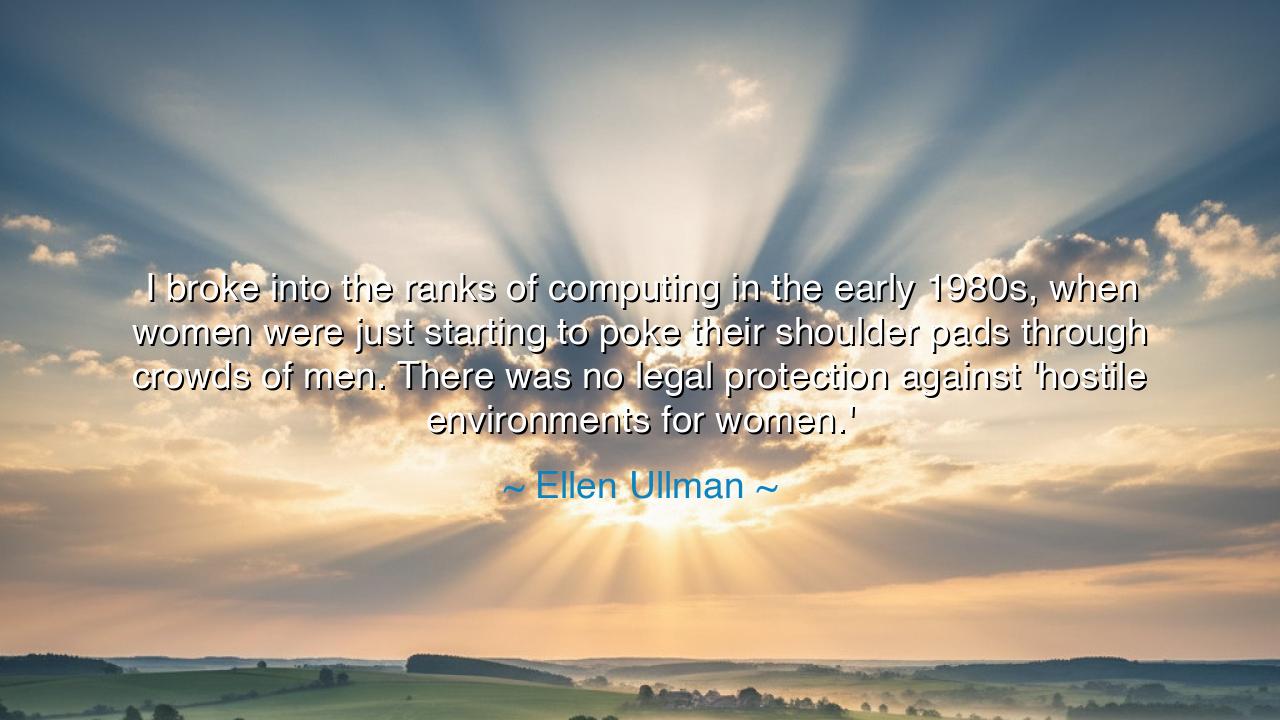
I broke into the ranks of computing in the early 1980s, when
I broke into the ranks of computing in the early 1980s, when women were just starting to poke their shoulder pads through crowds of men. There was no legal protection against 'hostile environments for women.'






Hear the bold and poignant words of Ellen Ullman, who bore witness to a time of exclusion and quiet struggle: “I broke into the ranks of computing in the early 1980s, when women were just starting to poke their shoulder pads through crowds of men. There was no legal protection against ‘hostile environments for women.’” In this remembrance, she speaks not only of her own journey, but of the era when women, armed with courage and determination, pressed against the barriers of male-dominated fields, carving out space where none had been granted.
The heart of her words lies in the image of shoulder pads, symbols of women in that age who donned the armor of fashion to enter boardrooms and laboratories, seeking to be seen as equals. These shoulder pads were not only fabric—they were shields, signifying strength in an environment that questioned their very presence. In the world of computing, where men filled the rooms, Ullman and her peers had to push their way forward, not invited but insistent, not welcomed but unyielding.
She names the absence of legal protection against “hostile environments,” and in doing so, she reminds us of a cruel truth: that women of her time were left to endure ridicule, dismissal, and harassment without recourse. The law, which should have been a shield, was silent, and silence too often sides with the oppressor. Thus, women relied not on institutions, but on their own resilience, forging paths with grit where justice had not yet been written.
History offers us countless reflections of this struggle. Consider the story of Ada Lovelace, the first to glimpse the power of computing in the 19th century. Though her insight was profound, her name was long overshadowed by men who claimed the stage. Or think of the women of NASA in the 1960s, the “hidden figures” whose calculations carried rockets to the stars, yet whose contributions were minimized. Ullman’s words, spoken of the 1980s, echo this longer history: women pushing against invisible walls, creating space where they were told none existed.
The meaning of her testimony is not despair but defiance. She broke into the ranks, though the doors were not open. She entered the field, though the field resisted her. She endured hostility, yet continued to build and to create. Her story proclaims a truth that must be passed down: that the advancement of women in technology, and indeed in all fields, was not granted by generosity of men, but won through struggle, persistence, and courage.
The lesson for us is clear and enduring: justice must never lag behind courage. Laws must evolve to protect those who dare to enter hostile spaces, and communities must honor the dignity of all who labor within them. But beyond law, each of us must cultivate vigilance: to speak when we see exclusion, to act when silence would perpetuate harm, and to build environments where no one needs armor to simply belong.
Therefore, children of tomorrow, take Ellen Ullman’s words as a testament of both warning and inspiration. Remember the women who pushed their way into rooms that resisted them. Remember that progress is not inevitable but earned through struggle. And remember that the work is not done, for hostile environments still linger, though laws now exist to resist them. Let your actions carry the torch forward: make space, defend dignity, and ensure that those who follow will enter not as intruders, but as rightful inheritors of every field of human endeavor.






AAdministratorAdministrator
Welcome, honored guests. Please leave a comment, we will respond soon